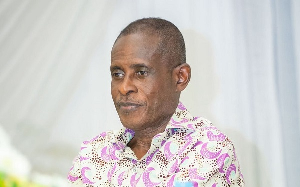USING DISHONOURABLE MEANS TO BECOME HONOURABLES – NO WAY!
The Gold Coast Ghana is about making a very sensitive decision in her life that will, if properly done, preserve her cherished achievements and (or) propels her advancements in all endeavours. The decision is crucially sensitive because Ghana has travelled through thick and thin to enjoy her current fifteen years of political stability.
The fifty-one year old Ghana has indeed learnt a lot of bitter and regrettable lessons in the substantial part of her life due to certain unconsidered decisions. Some of our political leaders, statesmen and indeed certain military officers have drifted this country from her destined path in the pursuit of their selfish, greed and parochial interests. These stomach-politicians and power drunkards have pitifully subjected our priceless natural and human resources to needless frustration.
ELECTION 2008 AND OUR POLITICIANS
Election 2008 (December 7th) is just around the corner. As usual, almost all the political parties are gluttonously seeking the immeasurable mandate of the good, well-informed and discerning people of Ghana. While some parliamentarians as well as their party presidential aspirants are eagerly doing everything possible to retain power, others as well as their political parties are anxiously crunching to capture power from the incumbent government. Most of these so-called party faithful and stalwarts are making trips to every corner of this country, hypocritically depicting that they have our welfare at heart, making deceitful, hollow and vain promises and shamefully breeding disunity among the populace through certain untoward remarks and dirty propaganda machineries.
THE HONOURABLES
Almost every parliamentarian, district chief executive and (or) assemblymember in this country wants to be associated with the title, honourable. Interestingly, this title has become so banal that every politician wants to be honoured with it. Regrettably, several of these self-serving politicians are using some dishonourable means to become honourables. Vote buying, deceitful and unrealistic promises, breeding of ethnocentricism, encouraging double and minor registration, beating war drums and indeed certain reprehensible political gimmicks and strategies have become the order of the day. Most of our politicians today are cunningly and manipulatively trading the conscience of some innocent Ghanaians in their quest to either retain or capture political power. The very people they claim to represent turned to be the subjects of their malevolence pursuits. No wonder most of these so-called politicians end up indulging in corrupt practices, because that is the secret behind their political victory. The saying ‘if you get yourself into any institution under-qualified, you survive there by cheating’ is worthy of our consumption.
VOTING FOR HONOURABLE POLITICIANS
A judge who fails to give a just and far-sighted judgment is as worst as a murderer since his unconsidered decision is more disastrous than a murderous act. I say this because unlike the murderer who may be imprisoned for life or put to death, the judge’s gauche verdict may become a precedent which may perpetuate injustice for so long a time until it is healed.
We, the electorates (voters), are the final judges in this impending election. Our inability, for example, to elect loyal, honest and faithful politicians will therefore mandate some other unprincipled and indecorous politicians to assume political power for, at least a four-year term. Our economy would thus be subjected to certain out-of-reach policies, unwarranted decisions and awkward utilization of our scarce resources. We therefore, sometimes, make mockery of ourselves when we persistently complain bitterly about certain commissions and omissions of some so-called leaders. In fact, their heinous decisions and corrupt practices are the direct and indirect results of the decision we took yesterday.
I believe we, Ghanaians, for the sake of posterity, have pensively resolved never to make any political mistake in this upcoming election. Our politicians, by our voting power, must be made to understand that we will pass our judgment (vote) based on the facts (their utterances, deeds and conduct) available. Passing judgment based on the ‘the facts available’ will enable us to elect polite, poised and productive politicians, who will serve our interests, because we are the source of their power. Indeed, they would be made to accept the fact that we will cast our votes based on their faithfulness and performances when exercising authority. That we, Ghanaians, are much awake, vigilantly doing our best possible never to fall prey to their typical scheming and deceitful ways. This we can do by casting away any ethnic spectacle and irrational stereotyped allegiance to certain political parties which hitherto we based our choice on. Wise discernment, pure objective outlook and the need to promote our national interest should be the only criteria which should influence our voting pattern.
CONCLUSION
I have always been saying that if Ghana is unable to grow and develop as we expect in the wake of our oil exploitation, then ‘nothing’ can remedy our somewhat slowly advancement having regarded the fact that we seemed not to have made much meaningful progress notwithstanding our rich mineral resources (gold, bauxite and manganese), forest reserves (timber), and cherished cocoa. The presence of these enviable and priceless resources are not enough, certain selfless, honest, loyal, noble, hardworking, focused, determined and faithful leaders are needed to tap and manage them for our general use. And this we must cause to happen by rejecting dishonourable politicians while voting for true, genuine and honest leaders. To such politicians, politics is about pragmatic policies, not polluting and poisoning the mind of the populace to disintegrate national cohesion.
Richard Obeng Mensah; borncapy@yahoo.com. The author is with the Faculty of Law, KNUST and Centre for Human Rights and Advanced Legal Research (CHRALER), Kumasi.
Opinions of Monday, 27 October 2008
Columnist: Mensah, Richard Obeng
Using Dishonorable Means To Become Honourables
Opinions













